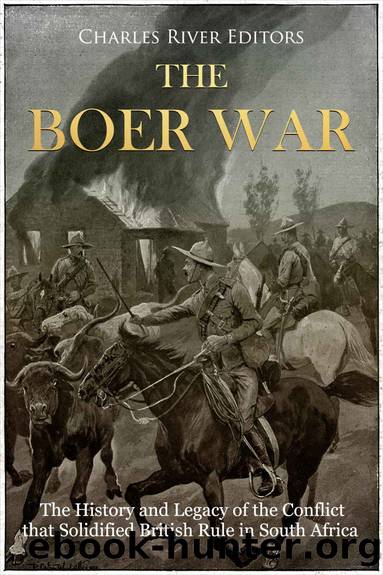The Boer War: The History and Legacy of the Conflict that Solidified British Rule in South Africa by Charles River Editors

Author:Charles River Editors
Language: eng
Format: epub
Publisher: Charles River Editors
Published: 2018-02-05T00:00:00+00:00
De Wet
Hertzog
In Pretoria, preparations began to be made to evacuate the government and prepare for an abandonment of the capital. President Kruger, 75 years old and in poor health, was put aboard a train, along with key members of his cabinet, and sent east towards Lourenço Marques, the main Portuguese East African port. Waiting for him there was the Dutch ship Gelderland, sent by Wilhelmina of the Netherlands to carry the Transvaal president away to safety. He would never return from his exile.
As Krugerâs train steamed eastward, an enormous British expeditionary force advanced steadily on Pretoria in three parts, with two bearing up from the south commanded by General Lord Roberts himself and a third approaching from Natal under the command of Buller. By June 4, Lord Roberts had advanced to within just a few miles of the city. Johannesburg had been taken relatively easy on May 31, 1900, since it was already largely a British settled city, and after that Roberts set his sights on Pretoria. General John French, commanding the 1st Cavalry Brigade, was detached from the main force and sent west, via the small town of Krugersdorp, to circle around Pretoria and position himself to the north behind enemy lines.
This was an odd move under the circumstances. Had Roberts deployed French and his mobile force east of Pretoria instead of west, he would have been able to capture the vital Delagoa Bay railway line, upon which Kruger had recently slipped away, cutting off any further Boer retreat and blocking the obvious route of escape that the Boer defenders and leadership would take. In all likelihood, however, Roberts probably gave no consideration to the possibility that the Boer civil and military leadership would do anything other than surrender upon the occupation of Pretoria. In the British rulebook of warfare, the capture of the enemyâs capital marked the end of the war, and the idea that the Boer would fall back on their time-honored principle of mobile warfare by abandoning their cities and taking to the countryside likely never occurred to him.
Behind the lines, however, de Wet had already begun mounting hit-and-run attacks against British positions, attacking from the rear, scoring several victories in quick succession, capturing quantities of arms and supplies, and inflicting significant casualties. Kitchener was promptly deployed south by Roberts to deal with this unexpected turn of events, but de Wet remained elusive. On the evening of June 12-13, Kitchenerâs guard unit was hit in a surprise raid, forcing Kitchener himself to flee the scene in his pajamas and take refuge in a nearby Yeomanry camp.
Download
This site does not store any files on its server. We only index and link to content provided by other sites. Please contact the content providers to delete copyright contents if any and email us, we'll remove relevant links or contents immediately.
| Africa | Americas |
| Arctic & Antarctica | Asia |
| Australia & Oceania | Europe |
| Middle East | Russia |
| United States | World |
| Ancient Civilizations | Military |
| Historical Study & Educational Resources |
Machine Learning at Scale with H2O by Gregory Keys | David Whiting(4296)
Never by Ken Follett(3937)
Fairy Tale by Stephen King(3370)
Oathbringer (The Stormlight Archive, Book 3) by Brandon Sanderson(3161)
The Man Who Died Twice by Richard Osman(3072)
Will by Will Smith(2911)
Rationality by Steven Pinker(2352)
Can't Hurt Me: Master Your Mind and Defy the Odds - Clean Edition by David Goggins(2324)
The Dark Hours by Michael Connelly(2300)
Friends, Lovers, and the Big Terrible Thing by Matthew Perry(2219)
The Dawn of Everything: A New History of Humanity by David Graeber & David Wengrow(2197)
Principles for Dealing With the Changing World Order: Why Nations Succeed and Fail by Ray Dalio(2043)
A Short History of War by Jeremy Black(1843)
HBR's 10 Must Reads 2022 by Harvard Business Review(1840)
Go Tell the Bees That I Am Gone by Diana Gabaldon(1754)
A Game of Thrones (The Illustrated Edition) by George R. R. Martin(1725)
Kingdom of Ash by Maas Sarah J(1668)
515945210 by Unknown(1662)
443319537 by Unknown(1546)
